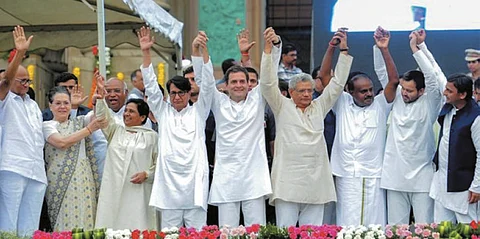

#Jacob Peenikaparambil
Bhopal | As the next round of Lok Sabha elections is nearing, efforts to form an opposition coalition are intensified. Media reported a meeting of Nitish Kumar of JDU and RJD leader Tejashwi Yadav with the Congress president Mallikarjun Kharge and Rahul Gandhi and the JDU leader in turn meeting other opposition leaders like AAP’s Arvind Kejriwal. Rahul Gandhi described the meeting as a "historic step" and a process that will “develop the Opposition's vision for the country".
Healthy functioning of democracy requires a strong opposition. A weak opposition often can result in the ruling party becoming authoritarian and autocratic. Continuous rule by one party without effective opposition can make the ruling party arrogant and corrupt. That is what happened to the Congress party in India in the first 25 years after independence. It became susceptible to corruption and decay and the governance of the country suffered badly because of its long stint in power.
The BJP with absolute majority in the Lok Sabha has been in power since 2014. Its majority in the Lok Sabha further increased in 2019. Because of its brute majority many laws were steamrolled through the parliament without much discussion and taking feedback from the different stakeholders. For example, the three controversial farm laws were passed in a hurry and it led to one of the strongest protests by farmers in the history of India and finally the government was forced to withdraw the laws. A hurriedly passed Citizenship Amendment Act (CAA) led to nationwide protests and upheavals. Many political observers are of the view that a coalition government is better than a government with a brute majority. Good governance requires a strong opposition to keep the government in power rule-based and people oriented.
In the 2019 Lok Sabha election, the BJP got only 37% of votes polled; still it got 303 seats out of 543. Division of votes among the opposition parties was one of the major reasons for the huge victory of the BJP. Hence the opposition parties coming together to give a tough fight to the BJP in the next Lok Sabha elections is to be appreciated. At the same time, opposition parties joining hands with each other just to defeat the ruling party may not evoke confidence in the people, and even if the ruling party is defeated, forming a stable government could be a problem.
Opposition unity is not an easy task. First of all, the opposition parties should agree on certain basic principles which are akin to the doctrine of the basic structure of the Indian constitution. They are the supremacy of the Constitution, republican and democratic forms of government, secular character of the constitution, separation of powers between the legislature, the executive and the judiciary and federal character of the Constitution. Religion should be kept away from politics as mixing religion with politics is disastrous.
Secondly, they should agree on a common minimum programme to solve the burning issues of people.
They should have a consensus on the leadership of the coalition, if they are elected to power. Hence, those opposition leaders who are dreaming of forming a coalition of opposition parties to fight the ruling party will have to pay attention to the above-mentioned factors. Without a solid positive and constructive agenda to solve the problems of people, efforts at opposition unity will not be effective.
jacobpt48@gmail.com
